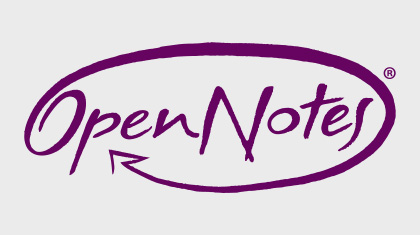
About a year and a half ago, longtime BIDMC patient Stacey Whiteman received shocking news from her physician.
“I have Multiple Sclerosis (MS) in my brain and in my spine,” she said. “Cognitively I am challenged. I can’t multitask anymore. I may look okay on the outside but on the inside, it is challenging, to say the least.”
Between physical therapy appointments and monthly infusions to slow down the progression of her disease, Whiteman began seeing Lissa Kapust, LICSW, Behavioral Neurology, to help cope with the emotional strains associated with her diagnosis.
“Stacey has so many strengths,” Kapust said. “But beyond the strengths, she has had a history of some problems with depression and anxiety. I think the issues with Multiple Sclerosis have also eroded her self-esteem.”
Even before Whiteman was diagnosed with MS, she was one of the growing number of patients who manage their health care using BIDMC’s secure patient portal, PatientSite. OpenNotes has become an invaluable tool for Whiteman to keep track of discussions with her health care providers, and she says that she is now very grateful to be able to read mental health notes from Kapust.
At BIDMC, OpenNotes has become the norm for ambulatory care. In most services, after a note is signed, patients receive an automated email notifying them that a note is available to be read onpatientsite.org.
As of Dec. 1, there are 85,500 patients at BIDMC using PatientSite. Since launching a pilot within psychiatry and social work, nearly one thousand of those patients now also have access to their mental health notes.
Stephen O’Neill, LICSW, Social Work Manager for Psychiatry and Primary Care, is one of the handful of social workers to share his notes with patients since the pilot began in March.
“We can certainly say at this point, the angst which most clinicians feared by sharing their notes is not materializing,” O’Neill said. “It has been strikingly quiet in this regard, with scattered exceptions. The vast majority of our patients are reporting that the notes are helpful and often clarifying. OpenNotes is not an end, it is one more means in giving our patients tools to assist them. Most patients report that it helps them to feel more in charge of their life and in a better ‘partnership’ with their clinical team.”
Whiteman agrees.
“I go back to my OpenNotes to remember what we talked about and to remember what we’ll be talking about next time,” Whiteman said.
“Notes make the therapy more alive,” Kapust explained. “For Stacey, it allows her to do some of the work agreed upon between sessions. The notes are terrific reminders.”
“For many patients, the opportunity to read a treatment note can help improve accuracy and reduce stigma,” said Michael Kahn, MD, Psychiatry, who is is helping develop materials that will help guide clinicians as the mental health pilot expands. “And that may encourage patients to address their mental health issues more actively.”
With the addition of Psychiatry and Social work, outpatient notes written by clinicians are now shared using OpenNotes in most ambulatory settings, including in Primary Care and all Medicine subspecialties, Surgery, Dermatology, Orthopaedics, Neurology, Nutrition and Rehabilitation Services.
“OpenNotes is another way our staff continues to show a longstanding commitment to providing excellent clinical care in collaboration with both colleagues and patients,” said Pamela Peck, PsyD, Clinical Director in Psychiatry.



